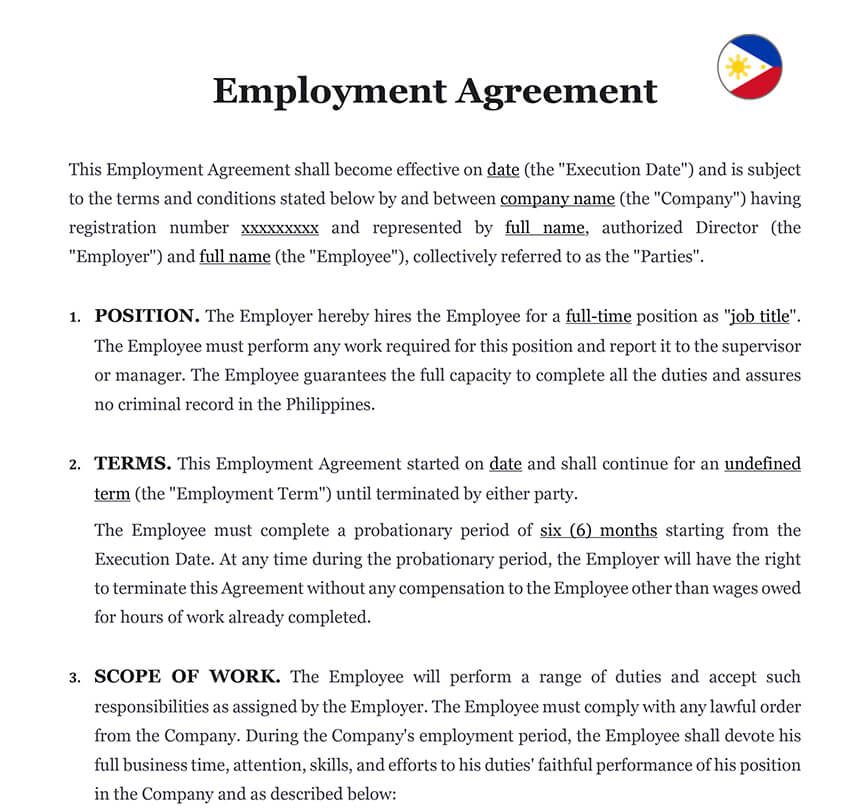Ready to use legal template
Drafted by experienced lawyers
Compliant with Filipino law
Ready to use legal template
Drafted by lawyers
Compliant with Filipino law
Learn more about Employment Contract in Philippines
An Employment Contract is a legally binding agreement between an employer and an employee that outlines the terms and conditions of employment, including job responsibilities, salary, benefits, working hours, and termination clauses. In the Philippines, employment contracts must comply with the Labor Code, ensuring fair treatment and legal protection for both parties. A well-drafted employment contract helps prevent disputes, sets clear expectations, and safeguards the rights of both employees and employers. Whether hiring full-time, part-time, or project-based workers, having a properly structured employment contract is essential to maintain compliance with labor laws and company policies. Download our expertly drafted Employment Contract, designed specifically for use in the Philippines, and easily edit it in Word format to suit your business needs.
Table of contents
-
What is an Employment Contract?
-
What are the different types of employment agreements?
-
Is written Employment Contract mandatory in the Philippines?
-
What are the important clauses that includes an Employment Contract?
-
What is labor law in the Philippines?
-
What is the process when hiring an employee in the Philippines?
-
What are the working conditions of an employee in the Philippines?
-
What is the role of collective bargaining agreements?
-
How to terminate an Employment Contract in the Philippines?
What is an Employment Contract?
An Employment Contract in the Philippines is a legally binding agreement between an employer and an employee, setting out the terms and conditions of the employment relationship. The contract of employment defines the rights, duties, and obligations of both parties, and is governed by Philippine labor laws.
The contract of employment must be in writing and must be executed before the employee begins work. The contract must include details such as the names and addresses of the employer and employee, the nature of the work to be performed, the period of employment, the place of work, the rate of pay, the number of working hours per day and per week, and the benefits to be provided to the employee.
ℹ️ An Employment Contract serves as proof of the terms and conditions of the employment relationship and helps to protect the rights of both the employer and the employee. In the event of a dispute, the employment contract can be used as evidence in resolving the issue.
What are the different types of employment agreements?
1. Fixed-Term employment agreement
A fixed-term employment agreement sets a specific end date for the employment relationship. This type of agreement is often used for seasonal or temporary workers, or for workers on a project-by-project basis.
2. Indefinite employment agreement
An indefinite employment agreement has no set end date, and continues until either the employee or the employer terminates the relationship. This type of agreement is the most common type of employment agreement and is used for full-time, permanent workers.
3. Part-Time employment agreement
A part-time employment agreement sets a specific number of working hours per week for the employee, who is usually paid on an hourly basis.
4. Freelance or consulting agreement
A freelance or Consulting Agreement sets the terms and conditions of the working relationship between an independent contractor and the company they work for. This type of agreement is often used for short-term projects or one-time assignments.
- Remarks:
If you want to hire a freelancer we suggest you download our Employee Confidentiality Agreement to protect your confidential business information.
Is written Employment Contract mandatory in the Philippines?
Under Philippine labor laws, all employment relationships must be governed by a written contract of employment, which sets out the terms and conditions of the employment relationship.
It serves as a record of the terms and conditions of the employment relationship, including the responsibilities, benefits, compensation, and other important details. Furthermore, it can help to ensure compliance with Philippine labor laws and regulations.
Failure to have a written contract of employment may result in penalties for the employer, as well as increased risk in the event of a dispute between the employer and employee. The written contract of employment serves as proof of the terms and conditions of the employment relationship, and helps to protect the rights of both the employer and the employee.
What are the important clauses that includes an Employment Contract?
A written employment contract is a crucial document in the Philippines and it should be executed before the employee begins work. The following are some of the important details that must be included in a written employment contract in the Philippines:
1. Job description: A clear and detailed description of the job responsibilities and duties of the employee.
2. Empolyer and employee information: The name, address, and contact information of the employee and employer. This may also include the employee’s Social Security System (SSS) number, Tax Identification Number (TIN).
3. Place of work: The contract should specify the location of the employee’s work and any conditions or restrictions that may apply, such as the need for travel or working outside of normal business hours.
4. Working hours: The normal working hours and the arrangements for overtime work, if applicable.
5. Wages and benefits: The employee’s salary, allowances, and other forms of compensation, such as bonuses, overtime pay, and leave benefits.
6. Probationary period: If applicable, the length of the probationary period, during which the employee may be terminated without cause.
7. Term of employment: The length of the contract, whether it is for a specific period of time or an indefinite period.
8. Termination: The grounds for termination of the contract, and the procedures to be followed in case of termination.
9. Confidentiality and non-compete clauses: If applicable, clauses that prohibit the employee from disclosing confidential information or from engaging in competitive activities during and after the employment.
10. Arbitration and dispute resolution: Provisions for resolving disputes, such as mediation or arbitration, if required. It is important to note that the employment contract should be in accordance with Philippine labor laws, and should not contain any provisions that are contrary to law or public policy
What is the labor law in the Philippines?
The Philippines has a comprehensive system of labor laws, which are contained in various laws and regulations, including the Labor Code of the Philippines, the Social Security Law, and the Philippine Overseas Employment Administration (POEA) Rules and Regulations.
The Labor Code of the Philippines sets out the general principles of labor law in the country, including the rights and responsibilities of employees and employers, the regulation of working conditions, and the protection of workers’ rights. The Social Security Law establishes the Social Security System (SSS), which provides social security benefits to eligible workers and their dependents, including retirement, disability, and death benefits.
The POEA Rules and Regulations regulate the deployment of Filipino workers to overseas employers, and provide protection for overseas Filipino workers (OFWs), including the regulation of recruiters and the establishment of a complaint and dispute resolution mechanism..
What is the process when hiring an employee in the Philippines?
The legal process when hiring an employee in the Philippines typically involves the following steps
Step 1. Job posting
The employer should post a job opening and advertise it through various channels, such as job boards, social media, or direct outreach to potential candidates.
Step 2. Employee Application review
The employer should review the applications received and select the most qualified candidates for an interview.
Step 3. Job Interview
The employer should conduct interviews with the selected candidates to assess their skills, experience, and qualifications for the job.
Step 4. Background check
The employer may conduct a background check on the selected candidate to verify the information provided in the application and to assess the candidate’s suitability for the job.
Step 5. Employee offer letter
If the employer decides to hire the candidate, the employer should provide the candidate with an offer letter that outlines the terms and conditions of the employment relationship, including the salary, benefits, and working hours.
ℹ️ Download the Employment Offer Letter to show your interest to your potential futur employees.
Step 6. Employment determination
The employer should determine the status of the employee as either a regular employee, probationary employee, project employee, or seasonal employee, in accordance with Philippine labor law.
Step 7. Draft contract
The employer and employee should execute an Employment contract that complies with Philippine labor law and includes all relevant clauses, such as job description, terms and conditions of employment, probationary period, non-compete and confidentiality, termination, dispute resolution, compliance with labor laws, and governing law.
Step 8. Compliance with labor laws
The employer should comply with all applicable Philippine labor laws, including the Labor Code of the Philippines, the Social Security Law, and the Philippine Overseas Employment Administration (POEA) Rules and Regulations, such as registering the employee with the Social Security System (SSS), the Home Development Mutual Fund (HDMF), and the Philippine Health Insurance Corporation (PHIC).
What are the working conditions of an employee in the Philippines?
The working conditions of an employee in the Philippines are governed by the Labor Code of the Philippines, as well as other relevant laws and regulations. The following are some of the key working conditions in the Philippines:
| ➤ Working hours: The normal working hours for an employee in the Philippines are eight hours per day, for five days per week, for a total of 40 hours per week. However, in some industries, such as retail and service, the normal working hours may be different. |
| ➤ Overtimes: Employees are entitled to overtime pay for work performed beyond the normal working hours. The overtime rate is 1.5 times the regular hourly rate. |
| ➤ Rest days: Employees are entitled to a rest day of at least 24 consecutive hours after every six consecutive working days. |
| ➤ Holidays: Employees are entitled to at least 12 regular holidays and 12 special non-working days, as declared by the Philippine government. |
| ➤ The Contract Labour (Regulation and Abolition) Act: This law regulates the employment of contract labor and provides for the registration of contractors and their workers, as well as for the inspection of their working conditions. It also provides for the abolition of contract labor in certain situations where it is deemed to be exploitative. |
| ➤ Holidays: Employees are entitled to at least 12 regular holidays and 12 special non-working days, as declared by the Philippine government. |
| ➤ Leaves: Employees are entitled to various types of leaves, such as annual leave, sick leave, and emergency leave, in accordance with Philippine labor law. |
| ➤ Health and safety: Employers are required to provide a safe and healthy working environment for their employees, and to take steps to prevent occupational hazards, such as accidents and illnesses. |
| ➤ Wages: Employees are entitled to receive a minimum wage, which is set by the Philippine government and varies by region. The minimum wage is reviewed periodically and may be adjusted to account for inflation and other factors. |
| ➤ Social security: Employers are required to register their employees with the Social Security System (SSS), the Home Development Mutual Fund (HDMF), and the Philippine Health Insurance Corporation (PHIC), and to contribute to these programs on behalf of their employees. |




